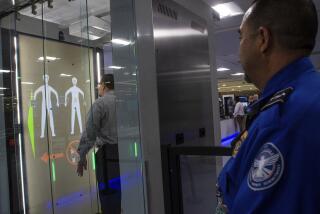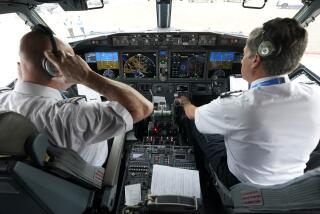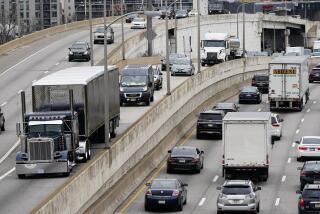4 Million Face Drug Testing in Transit Fields
- Share via
WASHINGTON — The Administration on Monday ordered random drug testing for more than 4 million airline pilots, truck drivers and other transportation employees, an action certain to spark more lawsuits over workers’ rights to privacy and the reliability of tests.
The sweeping rules issued by Transportation Secretary James H. Burnley IV are to begin taking effect late next year, but employee groups vowed to challenge them in court. Also, the rules could be affected by a pending U.S. Supreme Court decision on two more limited drug-testing programs that have been instituted by the government.
Popular Demand Cited
“The American people demand and expect a drug-free transportation system. These new rules will take us as far as practically possible toward that goal,” Burnley said.
The rules would subject employees with safety or security responsibilities to testing for the presence of marijuana, cocaine, opiates, amphetamines and phencyclidine (PCP). Besides being tested on a random basis, workers would face checks before employment, after an accident, for reasonable cause and at periodic medical exams.
Covered by the rules are 538,000 aviation industry employees, including pilots, flight attendants, mechanics, airport security screening personnel, flight engineers and aircraft dispatchers; 3 million truck and bus drivers operating in interstate commerce; 90,000 railroad employees, who are already subject to limited alcohol and drug testing regulations that are being challenged in a Supreme Court case; 195,500 mass transit employees; 120,000 seamen serving on commercial vessels, and 116,500 employees of companies that operate pipelines used to transport natural gas and hazardous liquids.
The Air Line Pilots Assn. denounced the call for random testing and protested that the rules only recommend, but do not require, that employees be given a chance for rehabilitation before they face possible firing.
“Pilots do not object to drug testing during pre-employment screening, for probable causes, following an accident or incident, or during and following a rehabilitation program,” ALPA President Henry A. Duffy said. “But random testing is a counterproductive, shotgun strategy that is an unwarranted invasion of privacy and of no significant value in the battle against drug abuse.”
Duffy said his group would go to court in an attempt to block the rules. Legal challenges also are expected from the Teamsters Union and an association representing independent truck owners and operators. Those groups and the American Trucking Assn. contended that the prescribed random-testing system is impractical and unnecessary.
“An important issue for us is DOT’s failure to require employers to offer employees a chance to be rehabilitated, a chance to get their job back if they test positive,” said Vernon McDougall, who represents the Teamsters safety and health department.
Under the rules, employees who test positive must be removed from safety- or security-related functions. They can be reinstated after rehabilitation, with the approval of a medical officer, and would be subject to follow-up testing. For some workers, such as airline pilots, government approval also may be necessary for returning to work.
Burnley said a two-tier system of testing would be required to ensure accuracy. If an employee’s urine tested positive for drugs in a preliminary test, the results would be double-checked in a more sophisticated procedure that has been shown to be almost 100% reliable, he said.
Mass transit systems that fail to implement a testing program will become ineligible for federal financial aid. The Southern California Rapid Transit District, which now requires drug testing only after a vehicle accident or a fight between employees, said it would have to study the new federal rules before commenting.
More to Read
Sign up for Essential California
The most important California stories and recommendations in your inbox every morning.
You may occasionally receive promotional content from the Los Angeles Times.










